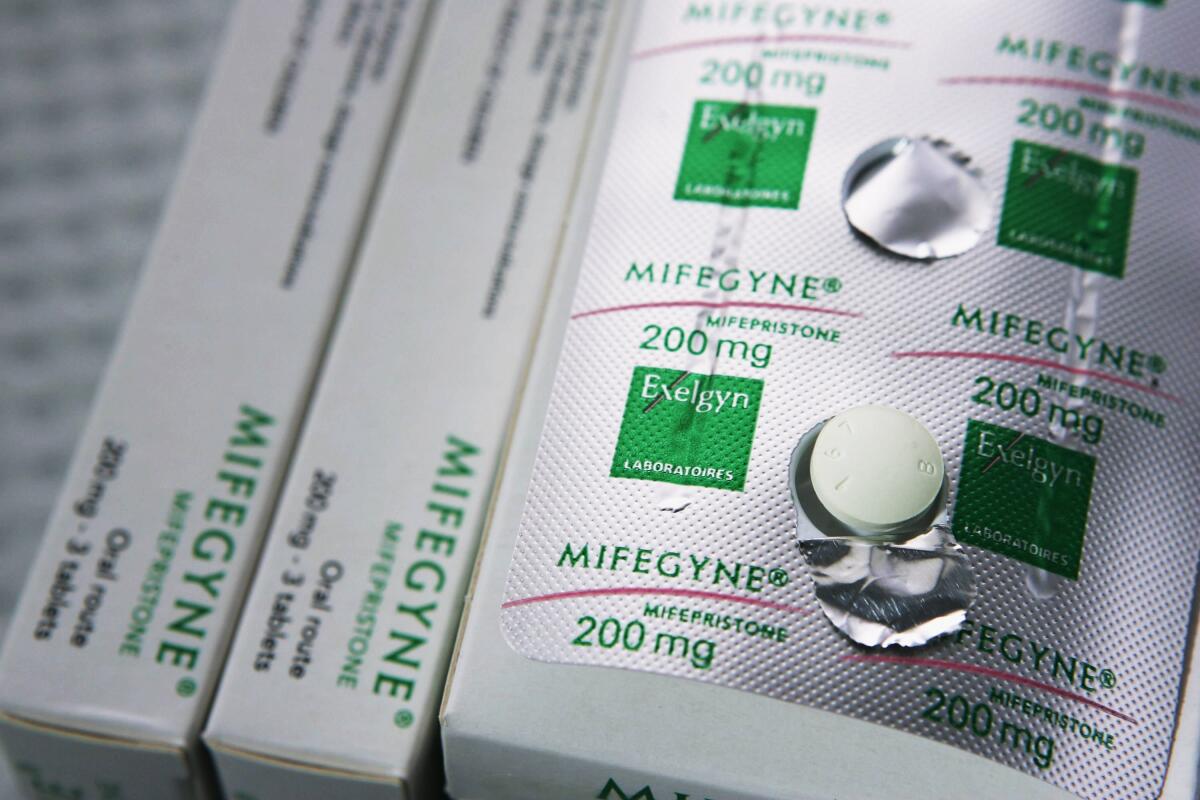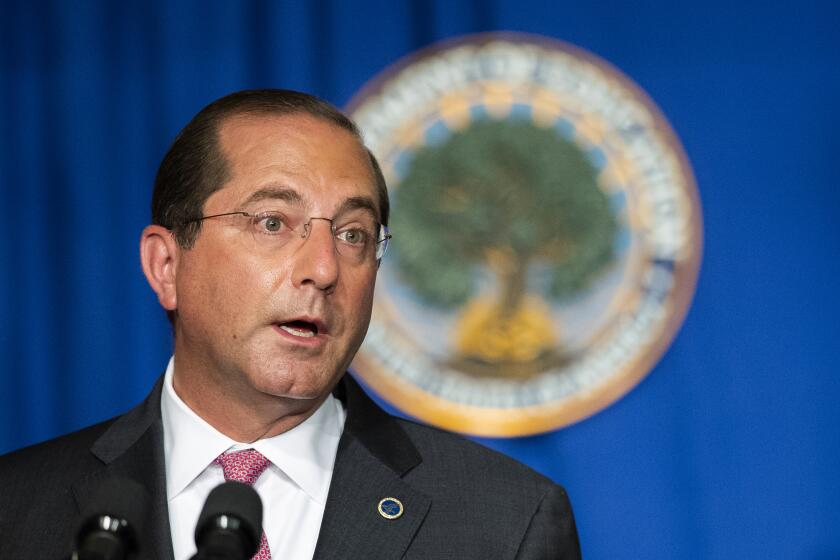Op-Ed: The FDA may be about to make the abortion pill more accessible

In the course of just a few weeks, the U.S. Supreme Court heard two cases on abortion access. The first, SB 8, is a Texas law banning abortion as early as six weeks into pregnancy. The second, Dobbs vs. Jackson Women’s Health Organization, is a Mississippi law banning abortion after the 15th week of pregnancy. Both cases could bring an end to the ability to access abortion as a federal right.
While the constitutional fight continues in court, there is another opportunity in the coming days for the federal government to help maintain abortion access: by allowing people to get abortion pills as soon as they need them.
Removing federal restrictions and letting all healthcare providers prescribe mifepristone, the first medication used in a medication abortion, would give more patients access to abortion care sooner. It also would acknowledge the reality that abortion is healthcare and should be treated that way.
Abcarian: We can’t count on the Supreme Court to save abortion rights. We’ll have to do it ourselves
A new strategy is needed to preserve reproductive rights. Two legal titans of abortion rights propose a ‘long-term moon shot’ as a way forward.
In the 21 years since mifepristone was approved by the Food and Drug Administration for ending early pregnancies, it has been subject to tight restrictions that prevent its use by those who need it. The FDA allows the drug to be dispensed only by a certified prescriber in certain healthcare settings.
This means it cannot be dispensed through telehealth and mail and it cannot be offered through a pharmacy prescription. Clinicians must keep it in stock and only those who advertise as abortion providers tend to do so. For patients who want a medication abortion, this means having to travel to a specialized abortion clinic — sometimes hundreds of miles away — simply to be handed pills that have an extremely low risk of complications, even lower than Tylenol or Viagra.
But in April the FDA announced that it would temporarily waive mifepristone’s in-person dispensation requirements during the COVID pandemic. This was followed by a Biden administration announcement that the agency would review the dispensing policy for the drug, part of a lawsuit, Chelius vs. Becerra, that challenged the FDA’s restrictions. In a status report, the agency said it will complete its review on whether to permanently waive the in-person requirements, clearing the way for pharmacy dispensing of this medication, by mid-December .
A federal judge has agreed to suspend a rule that requires women during the COVID-19 pandemic to visit a hospital, clinic or medical office to obtain an abortion pill.
The April decision opened a window of opportunity. Providers in some states began to prescribe mifepristone for abortions using telehealth — thus helping to bridge the gap for people who cannot or prefer not to travel. This model involves a remote consult and delivery of medications via mail-order pharmacy. My team at UC San Francisco has been studying this innovation in abortion care, and while our research is ongoing, our current findings show that it is safe and effective.
However, relying on telehealth cannot be the only solution. For one thing, 19 states ban telemedicine for abortion either specifically or indirectly, by requiring the clinician to be physically present when the drug is used. Additionally, hundreds of thousands of people in the U.S. don’t have reliable internet connectivity — for them, telehealth is yet another hurdle to getting care.
The FDA’s permanent removal of dispensing requirements could open up broader possibilities. Patients could obtain prescriptions for abortion pills from their own primary care providers, rather than traveling to a specialized clinic. This would give them greater privacy, require less time off work and allow them to have a trusted local clinician for support. People could get medication abortions from nurse practitioners. Rural patients could go to local health clinics. College students could get prescriptions from their student health centers instead of going off-campus. This expansion would enhance patient-centered care, given that many patients would prefer to get their abortion from their primary care provider.
The College Student Right to Access Act would require California public university students on-campus access to the “abortion pill.” It’s on Gov. Newsom’s desk, and he should sign it.
Of course, such transformation would not happen overnight. Even if the FDA lifted restrictions, expanded access would still require fighting state-imposed abortion restrictions — including mandates that only physicians administer medication abortion — that hinder the ability of patients to get the medication.
Nonetheless, the FDA’s decision could present a vital opportunity to provide broader abortion access in states that protect the right. This move also would make it somewhat easier for patients from restricted-access states who have to travel out of state to get abortion care if Roe vs. Wade is struck down.
The FDA should treat the abortion pill the way it would treat other medications that have proven to be safe, effective and beneficial to patient care — by following the science and making it available to all who need it.
Ushma Upadhyay is an associate professor and public health social scientist at Advancing New Standards in Reproductive Health at UC San Francisco. She is co-director of the UC Global Health Institute’s Center of Expertise on Women’s Health, Gender, and Empowerment. @UshmaU
More to Read
A cure for the common opinion
Get thought-provoking perspectives with our weekly newsletter.
You may occasionally receive promotional content from the Los Angeles Times.









